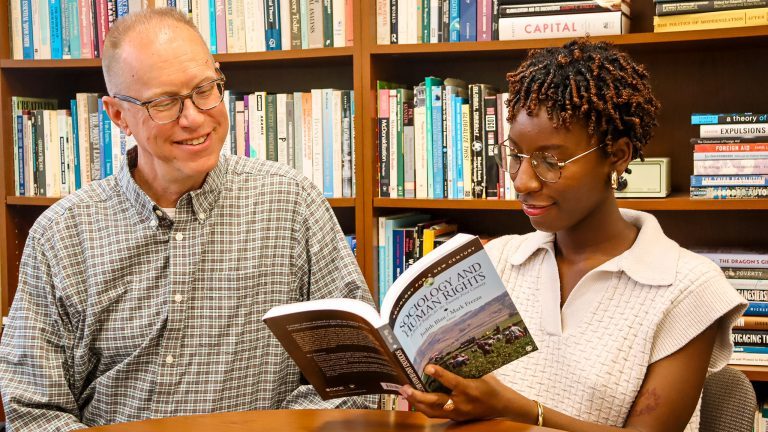Sociology, B.A.
Examine the dynamics of social interaction and social problems.

“The department fosters interdisciplinary research that is necessary to answer complex social questions."
Emma Willoughby (B.A. in Sociology and Liberal Studies '13)
Doctoral Student, University of Michigan
About the Bachelor of Arts in Sociology
The Department of Sociology and Anthropology in the College of Liberal Arts offers the B.A. in Sociology. Sociology majors learn basic tools of sociological analysis including social research methods-both quantitative and qualitative-and theory. The curriculum equips students to more effectively negotiate the diverse society in which we live by addressing social inequalities, culture, community development, social institutions, and social change.
The minor in sociology is available on the Oxford as well as regional campuses.
The Value of a Sociology Degree
Employers are looking for students who have developed the multi-disciplinary and critical thinking skills necessary to better understand our globally connected and diverse world. Sociology training is so important to those in healthcare professions that it was added to admissions tests for medical schools!
Students who major in sociology will leave with training in research design and methodology. They also gain communication skills that are useful in a wide range of careers, including health care, law, business, demography, drug counseling, education, criminology, human resources, government services, consumer advocacy, corrections, city planning, community relations, labor relations, child welfare, counseling, marketing, gerontology research, and more.
On this Page…
Program Information
Degree
B.A. in Sociology
Required Credit Hours
120
Program Type
Minor
Minor
School
Duration
4 Years
Degree Requirements
Find out about credit hour and course requirements from the 2025-26 academic catalog.
Students in the College of Liberal Arts earning the B.A. degree have a common set of 48-50 hours of general education. The specific courses taken to complete the categories of general education may differ between majors.
Categories of General Education:
- First Year Writing I, II
- English Literature Survey
- Modern or Ancient Language
- History
- Additional Humanities
- Fine or Performing Arts Appreciation
- Mathematics
- Social Sciences
- Natural Sciences
To see the details for these general education requirements, visit the UM online catalog or the degree sheet attached at the top of this webpage.
Students in the B.A. in Sociology complete 10 sociology courses (30 credit hours), including core sociology courses and elective sociology courses. Students earning the B.A. in the College of Liberal Arts also complete a minor field of study (or double major).
- Soc 101: Introductory Sociology I
- Soc 302: Sociological Theory
- Soc 365: Methods of Social Research
- Seven elective sociology courses (21 credit hours)
A minor in sociology consists of 6 sociology courses (18 credit hours), providing maximum flexibility in pursuing the areas of sociology that interest you the most.
See all the sociology courses in the online catalog.
The minor in sociology is available on the Oxford as well as regional campuses.
Department Opportunities
Video: What is Sociology?
Hear firsthand from students, faculty, and staff about the Sociology program.
What Can You Do With a Sociology Major?
- Vice President, Trustmark National Bank
- International Systems Advisor, FedEx
- Social Worker, San Diego Welfare Department
- Minister, First Baptist Church
- Counselor, MS Department of Rehab Services
- President, Brown-Olmstead PR Firm
- Marketing, Verizon Wireless
- Senior Sales Representative, GlaxoSmithKline
- Youth Court Judge, Lee County Court
- Founder, Southern Recovery Advocacy
- Dir. of Youth Services, MS Dept. of Human Services
- Humanitarian Relief, Save the Children
- Travel Editor, Houston Chronicle
- Human Resources Director, Marriott
- CEO, Memorial Hermann Health Systems
- Guidance Counselor, E. Baton Rouge High School
- Data Scientist, US Census Bureau
Welcome to the College of Liberal Arts
As Coordinator of Student Recruitment for the College of Liberal Arts, I work with students, and their parents, who are interested in attending UM for their undergraduate degrees. I coordinate personalized visits to our departments, answer questions about the majors and programs in the CLA and handle all recruitment communications from the CLA. Please feel free to send me any questions you may have. It is my job to make sure you have everything you need to make an informed decision on where to spend your college career, and I hope it will be with the College of Liberal Arts at the University of Mississippi!
Annabelle Harris
Admissions Counselor
Future CLA Students

College of Liberal Arts Undergraduate Students
We invite future undergraduates to learn about the College of Liberal Arts, the value of the liberal arts education, our programs, career opportunities, and resources to help you succeed. You can also request a personalized degree sheet.
Next Steps
Explore Affordability
We have a variety of scholarships and financial aid options to help make college more affordable for you and your family.
Apply to the University of Mississippi
Are you ready to take the next step toward building your legacy?
